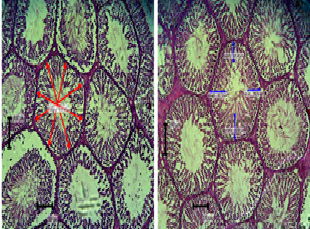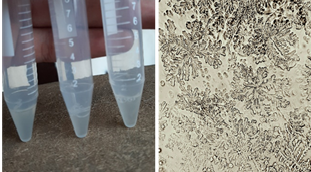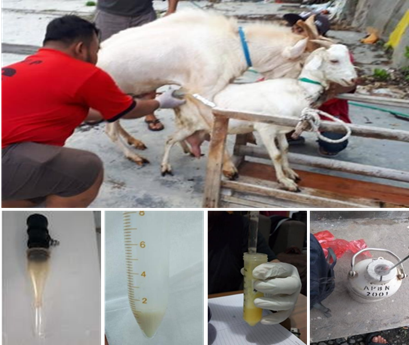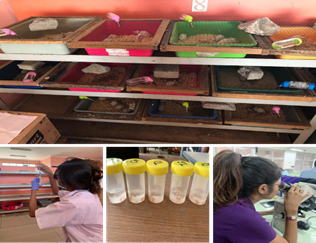Tomato (Lycopersicon esculentum Mill.) juice restored the number of Leydig cells, and the diameter of the seminiferous tubules of mice (Mus musculus) exposed to lead acetate
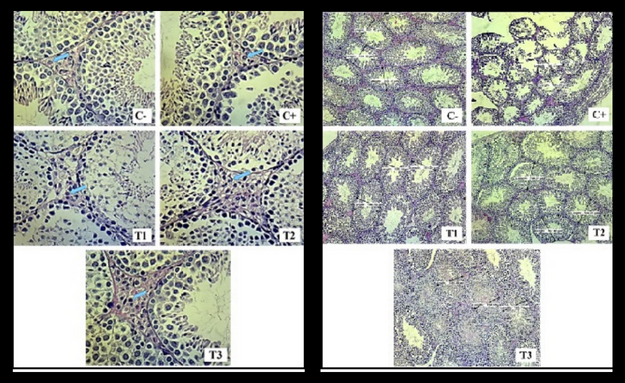
Downloads
Lead is a harmful pollutant from engine exhaust that causes free radicals and has detrimental effects on the testicular tissue. This study aimed to determine the effects of tomato juice on the number of Leydig cells and the diameter of the seminiferous tubules of mice exposed to lead acetate. Twenty-five male mice were divided into five groups. Mice in the control (C-) group were given placebos. Meanwhile, mice in C+, T1, T2, and T3 groups were exposed to lead acetate at a dose of 100 mg/kg BW/day for 14 days and given tomato juice respectively at 0, 0.16, 0.32, and 0.64 mL/day from day 8 to day 35. On day 36, all mice were sacrificed, and the testes were collected for histological preparation. The result showed that lead exposure in the C+ group decreased (p <0.05) in the number of Leydig cells and the diameter of the seminiferous tubules compared to the mice in group C-. Administration of tomato juice in groups T1, T2, and T3 increased (p <0.05) the number of Leydig cells and the diameter of seminiferous tubule compared to the mice in the C+ and C- groups. However, tomato juice administration to the T3 group decreased the number of Leydig cells and the diameter of the seminiferous tubules (p <0.05) compared to the T2 group. In conclusion, an effective dose of 0.32 mL/day of tomato juice restored Leydig cell number and seminiferous tubules diameter in mice exposed to lead acetate.
Adikwu E, Deo O, Geoffrey O-Bp, Enimeya Da. 2014. Lead Organ and Tissue Toxicity: Roles of Mitigating Agents (Part2). Br J Pharmacol. 5: 1-15.
Ali MY, Sina AA, Khandker SS, Neesa L, Tanvir EM, Kabir A, Khalil MI, Gan SH. 2020. Nutritional Composition and Bioactive Compounds in Tomatoes and Their Impact on Human Health and Disease: A Review. Foods 10: 45.
Asadi N, Bahmani M, Kheradmand A, Rafieian-Kopaei M. 2017. The Impact of Oxidative Stress on Testicular Function and the Role of Antioxidants in Improving it: A Review. J Clin Diagn Res. 11: IE01-IE05.
Bast A, Haenen GR. 2013. Ten misconceptions about antioxidants. Trends Pharmacol Sci. 34: 430-6.
Corcoran MP, McKay DL, Blumberg JB. 2012. Flavonoid basics: chemistry, sources, mechanisms of action, and safety. J Nutr Gerontol Geriatr. 31: 176-89.
Fitri PE, Wurlina W, Chusniati S, Suwanti LT, Plumeriastuti H, Mufasirin M. 2019. Effect of honey in spermatogenesis staging and leydig cells in mice (Mus musculus) infected by Toxoplasma gondii. Ovozoa: J Anim Reprod. 8: 10-6.
Garu U, Sharma R, and Barber I. 2011. Effect of Lead Toxicity on Developing Testis of Mice. Int J Pharmaceu Sci Res. 2: 2403-7.
Ghosh A, Tripathy A, Ghosh D. 2022. Impact of Endocrine Disrupting Chemicals (on Reproductive Health of Human. Proc Zool Soc. 75: 16-30.
Gulkesen KH, Erdogru T, Sargin CF, Karpuzoglu G. 2002. Expression of Extracellular Matrix Proteins and Vimentin in Testes of Azoospermic Man: an Immunohistochemical and Morphometric Study. Asian J Androl. 4: 55-60.
Hamadouche NA, Sadi N, Aoues A. 2013. Lead Toxicity and the Hypothalamic- Pituitary-Testicularaxis. Not Sci Biol. 5: 1-16.
Handaru M, MN Sri, Indah SNK. 2010. Tomatoes Juice Reduce Bronchus Epithelial Cell in Rat with Sub Chronic Exposed to Cigarette Smoke. Jurnal Kedokteran Brawijaya. 26: 32-36.
Igile GO, Ekpe OO, Essien NM, Bassey SC, Agiang MA. 2016. Quality Characteristics of Tomato Juice Produced and Preserved with and without its Seed. Donnish J Food Sci Technol. 2: 1-9.
Imran M, Ghorat F, Ul-Haq I, Ur-Rehman H, Aslam F, Heydari M, Shariati MA, Okuskhanova E, Yessimbekov Z, Thiruvengadam M, Hashempur MH, Rebezov M. 2020. Lycopene as a Natural Antioxidant Used to Prevent Human Health Disorders. Antioxidants 9: 706.
Machmudia A, Eliyani H, Widjiati W, Wurlina W. 2021. Effect of α-tocopherolon spermatogenic and Leydig cellcounts of white rats (Rattus norvegicus) exposed to 2,3,7,8-Tetrachlorodibenzo-p-dioxin. Ovozoa: J Anim Reprod. 10: 74-9.
Majzoub A, Agarwal A, Esteves SC. 2017. Antioxidants for elevated sperm DNA fragmentation: a mini review. Transl Androl Urol. 6: S649-S653.
Majzoub A, Agarwal A. 2018. Systematic review of antioxidant types and doses in male infertility: Benefits on semen parameters, advanced sperm function, assisted reproduction and live-birth rate. Arab J Urol. 16: 113-24.
Makhlouf M, Saad Eldien HM, Zagloul D, Abu Dief E, Elhaliem NA. 2008. The Effect of Lead Acetate on Testiscular Structure and Protective Effect of Vitamin E in Adult Albino Rat. Egypt. J Histol. 31: 406-18.
Mardatillah M, Wurlina W, Yudaniayanti IS, Plumeriastuti H, Primarizky H, Hamid IS. 2022. Moringa oleifera leaf extract restored the diameter and thickness of the seminiferous tubules of rat (Rattus norvegicus) injected with gentamicin. Ovozoa: J Anim Reprod. 11: 15-21.
Martí R, Roselló S, Cebolla-Cornejo J. 2016. Tomato as a Source of Carotenoids and Polyphenols Targeted to Cancer Prevention. Cancers (Basel) 8: 58.
Mendelová A, Fikselová M, Mendel L. 2013. Carotenoids and lycopene content in fresh and dried tomato fruits and tomato juice. Acta Univ Agric Silvic Mendel Brun. LXI: 1329-37.
Munteanu IG, Apetrei C. 2021. Analytical Methods Used in Determining Antioxidant Activity: A Review. Int J Mol Sci. 22: 3380.
Ng CP, Hashim NH, Adli DSH. 2014. Effects of Nigella sativa (Habbatus sauda) Oil and Nicotine Chronic Treatments on Sperm Parameters and Testis Histological Features of Rats. Evid Based Complement Alternat Med. 2014: 218293.
Ramaswamy S, Weinbauer GF. 2015. Endocrine control of spermatogenesis: Role of FSH and LH/ testosterone. Spermatogenesis 4: e996025.
Salawu EO, Adeeyo OA, Falokun OP, Yusuf UA, Oyerinde A, Adeleke AA. 2009. Tomato (Lycopersicon esculentum) prevents lead-induced testicular toxicity. J Hum Reprod Sci. 2: 30-4.
Sassykova LR, Aubakirov YA, Sendilvelan S, Tashmukhambetova ZK, Faizullaeva MF, Bhaskar K, Batyrbayeva AA, Ryskaliyeva RG, Tyussyupova BB, Zhakupova AA, Sarybayev MA. 2019. The Main Components of Vehicle Exhaust Gases and Their Effective Catalytic Neutralization. Orient J Chem. 35: 1-10.
Shahid M, Pourrut B, Dumat C, Nadeem M, Aslam M, Pinelli E. 2014. Heavy-metal-induced reactive oxygen species: phytotoxicity and physicochemical changes in plants. Rev Environ Contam Toxicol. 232: 1-44.
Shan G, Tang T, Zhang X. 2009. The Protective Effect of Ascorbic Acid and Thiamine Supplementation Against Damage Caused by Lead in the Testes of Mice. J Hazhong Univ Sci Technol Med Sci. 29: 68-72.
Thilakarathna SH, Rupasinghe HP. 2013. Flavonoid bioavailability and attempts for bioavailability enhancement. Nutrients 5: 3367-87.
Thoreux-Manlay A, Le Goascogne C, Segretain D, Jégou B, Pinon-Lataillade G. 1995. Lead affects steroidogenesis in rat Leydig cells in vivo and in vitro. Toxicology 103: 53-62.
Wang B, Wang B, Lv B, Wang R. 2022. Impact of Motor Vehicle Exhaust on the Air Quality of an Urban City. Aerosol Air Qual Res. 22: 220213.
Xu W, Guo G, Li J, Ding Z, Sheng J, Li J, Tan W. 2016. Activation of Bcl-2-Caspase-9 Apoptosis Pathway in the Testis of Asthmatic Mice. PLoS One 11: e0149353.
Yu Y, Yu L, Zhou X, Qiao N, Qu D, Tian F, Zhao J, Zhang H, Zhai Q, Chen W. 2020. Effects of acute oral lead exposure on the levels of essential elements of mice: a metallomics and dose-dependent study. J Trace Elem Med Biol. 62: 126624.
Zirkin BR, Papadopoulos V. 2018. Leydig cells: formation, function, and regulation. Biol Reprod. 99: 101-11.
Copyright (c) 2022 Revina Ayu Septiani , Iwan Sahrial Hamid , Emy Koestanti Sabdoningrum , Anwar Ma'ruf , Eka Pramyrtha Hestianah , Maslichah Mafruchati

This work is licensed under a Creative Commons Attribution-ShareAlike 4.0 International License.
Ovozoa by Unair is licensed under a Creative Commons Attribution-ShareAlike 4.0 International License.
1. The journal allows the author to hold the copyright of the article without restrictions.
2. The journal allows the author(s) to retain publishing rights without restrictions
3. The legal formal aspect of journal publication accessibility refers to Creative Commons Attribution Share-Alike (CC BY-SA).
4. The Creative Commons Attribution Share-Alike (CC BY-SA) license allows re-distribution and re-use of a licensed work on the conditions that the creator is appropriately credited and that any derivative work is made available under "the same, similar or a compatible license”. Other than the conditions mentioned above, the editorial board is not responsible for copyright violation.































